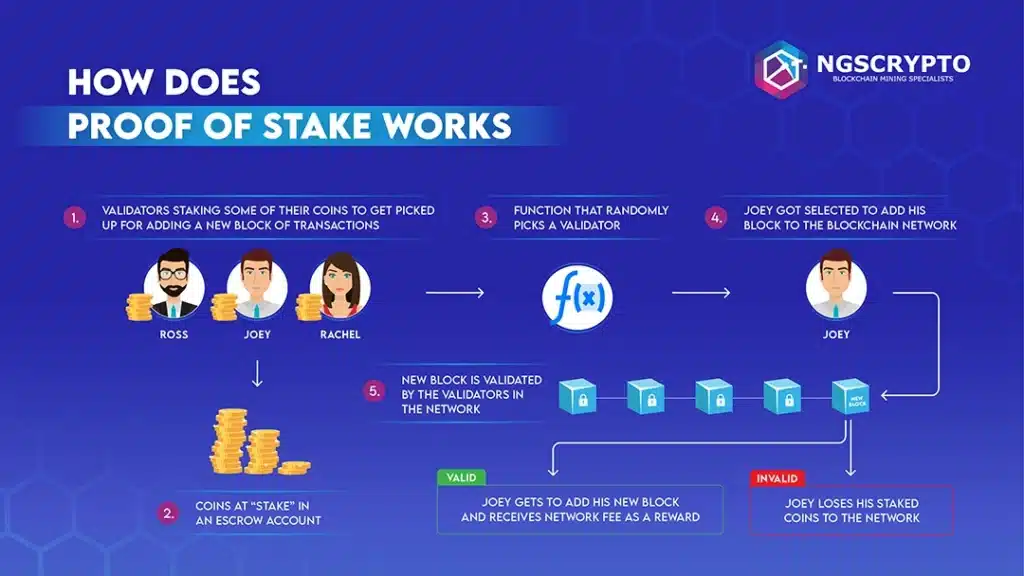NGS Crypto is an Authorised Reseller of NGS Group Blockchain Mining Packages
NGS Crypto is an Authorised Reseller of NGS Group Blockchain Mining Packages


Written by Katya Richardson
Share this article
In the ever-evolving landscape of blockchain technology, two fundamental consensus mechanisms, Proof of Work (PoW) and Proof of Stake (PoS), have emerged as pillars of innovation. These two approaches, each with its own unique set of advantages and trade-offs, have captured the attention of blockchain enthusiasts and developers alike.
As the blockchain ecosystem grows and diversifies, the option between PoW and PoS has become critical for projects attempting to establish secure and durable decentralised networks. In this article, we will explore the complexity of PoW and PoS, as well as their various benefits and drawbacks, in order to shed light on the future direction of blockchain technology.
During the development of Bitcoin, there was a significant difficulty that Nakamoto addressed. This challenge involved establishing a method for verifying transactions without depending on a trusted third party or central authority, such as a traditional financial institution. To address th is issue, Nakamoto implemented a sophisticated consensus algorithm known as “Proof of Work”.
Proof of work (PoW) is a decentralized consensus mechanism. A blockchain ledger is like a digital record book of transactions linked together in blocks. A Proof of Work system is used to validate new transactions and aid in reaching a consensus on the blockchain.

This is crucial for preventing any sneaky changes to transactions. If someone tries to put a dodgy transaction on the network, it gets rejected fast by all the computers on the blockchain. This makes sure that cryptocurrencies can be used safely without needing a central authority.
Proof of Stake incorporates many similar principles to Proof of Work but with a few notable differences. This innovative concept took shape in 2012 through the collaborative efforts of two visionary developers, Scott Nadal and Sunny King. Their primary aim was to address the perceived energy consumption issues associated with the Proof of Work system.
Proof-of-stake is a cryptocurrency consensus mechanism used to process transactions and create new blocks on a blockchain. Unlike Proof of Work (PoW), which relies on computational work and energy consumption, PoS operates on a different principle.
In a PoS system, validators (sometimes called forgers or stakers) are chosen to create new blocks and verify transactions based on the number of cryptocurrency tokens they hold and are willing to “stake” or lock up as collateral.

Both PoS and PoW have advantages and disadvantages, much like other competing technologies or systems. But it’s worth considering the benefits and drawbacks of each to determine which is preferable for you.
| Proof of Work (PoW) | Proof of Stake (Pos) |
| The probability of mining a block is determined by how much computational work is done by the miner. | The probability of validating a new block is determined by how large of a stake a person holds (how many coins they possess). |
| A reward is given to the first miner to solve the cryptographic puzzle of each block. | The validator does not receive a black reward instead they collect a network fee as their reward. |
| To add each block to the chain, miners must compete to solve difficult puzzles using their computer process power | There is no competition as the block creator is chosen by an algorithm based on user stake. |
| Hackers would need to have 51% of computation power to add malicious blocks. | Hackers would need to own 51% of all cryptocurrency on the network, which is practically impossible. |
| Proof of work systems are high energy usage. | Proof of Stake systems are much more low energy usage. |
| Specialized equipment to optimize processing power. | A standard server-grade unit is more than enough. |
| Bitcoin is the most well-known crypto with a Proof of Work consensus-building algorithm function called SHA256. | Some of the cryptocurrencies that use different variants of proof-of-stake consensus are: EOS (EOS). Tezos (XTZ). Cardano (ADA), Cosmos (ATOM). Lisk (LSK). |
Here are the pros and cons of PoW :
Pros of PoW :
Cons of PoW :
For those unfamiliar with the intricacies of blockchain mining, it’s a process used to add transaction records to the blockchain and entails various users competing for rewards.
Here are the Pros and Cons of PoS
Pros of PoS :
Cons of PoS :
Summary
PoW and PoS are two of the most popular consensus mechanisms used in the crypto ecosystem. Although they have certain commonalities, they also differ significantly from one another, which makes them more suited for various sorts of networks.
In the realm of blockchain technology and cryptocurrencies, PoW, with its robust security model and established reputation, has served as the foundation for pioneering digital currencies like Bitcoin. Nonetheless, there have been growing concerns about its energy-intensive nature and its implications for environmental sustainability. Conversely, PoS presents a more energy-efficient option, enabling participants to authenticate transactions and generate new blocks based on their stake in the network.
The choice between PoW and PoS frequently hinges on the specific aims and priorities of a blockchain project. PoW might be the preferred choice for networks that prioritize security and decentralization, whereas PoS may be a more suitable option for those aiming for scalability and long-term sustainability.
So which one is better between PoW and PoS? there’s no clear-cut winner; instead, it’s about picking the appropriate tool for the task at hand. Both consensus mechanisms have their strengths and weaknesses, and their effectiveness hinges on the specific situation in which they are employed.
The information presented on this website is general information only. It should not be taken as constituting professional advice from the website owner – NGS Crypto PTY LTD (NGS Crypto). Any information regarding past performance and returns contained on this website should not be construed or interpreted as a prediction or opinion as to future performance and returns. NGS Crypto is not a financial adviser. All views and observations expressed by NGS Crypto on this website are for information purposes only, are general in nature and should not be treated as investment or financial advice of any kind.
NGS Crypto is an authorised reseller of NGS Group blockchain mining packages. The information presented on this website (https://ngscrypto.com) is general information only. It should not be taken as constituting professional advice from the website owner – NGS Crypto PTY LTD (NGS Crypto). Any information regarding past performance and returns contained on this website should not be construed or interpreted as a prediction or opinion as to future performance and returns. NGS Crypto is not a financial adviser. All views and observations expressed by NGS Crypto on this website are for information purposes only, are general in nature and should not be treated as investment or financial advice of any kind. Before making an investment in crypto assets, you should consider seeking independent legal, financial, taxation or other such professional advice to check how the information on this website relates to your unique circumstances. NGS Crypto is not liable for any loss caused, whether due to negligence or otherwise arising from the use of, or reliance on, the information provided directly or indirectly, by use of this website. You can view our full terms & conditions by clicking here.
NGS Crypto is not affiliated, associated, authorized, endorsed by, or in any way officially connected with this NGS Super (ABN 73 549 180 515).
© 2024 NGS Crypto
NGS Crypto is an Authorised Reseller of NGS Group
| Cookie | Duration | Description |
|---|---|---|
| cookielawinfo-checkbox-analytics | 11 months | This cookie is set by GDPR Cookie Consent plugin. The cookie is used to store the user consent for the cookies in the category "Analytics". |
| cookielawinfo-checkbox-functional | 11 months | The cookie is set by GDPR cookie consent to record the user consent for the cookies in the category "Functional". |
| cookielawinfo-checkbox-necessary | 11 months | This cookie is set by GDPR Cookie Consent plugin. The cookies is used to store the user consent for the cookies in the category "Necessary". |
| cookielawinfo-checkbox-others | 11 months | This cookie is set by GDPR Cookie Consent plugin. The cookie is used to store the user consent for the cookies in the category "Other. |
| cookielawinfo-checkbox-performance | 11 months | This cookie is set by GDPR Cookie Consent plugin. The cookie is used to store the user consent for the cookies in the category "Performance". |
| viewed_cookie_policy | 11 months | The cookie is set by the GDPR Cookie Consent plugin and is used to store whether or not user has consented to the use of cookies. It does not store any personal data. |